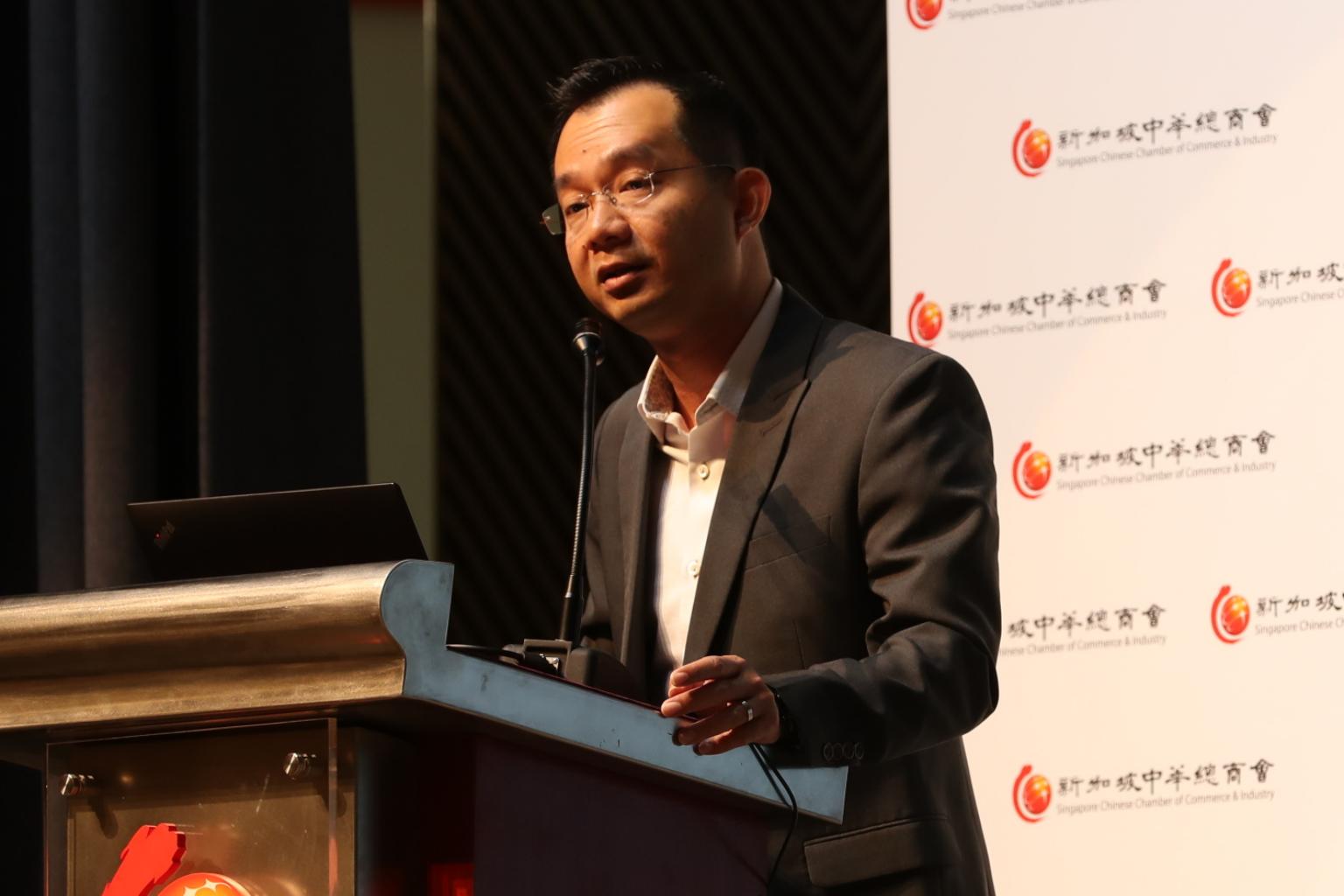SMEs will be future drivers of Singapore economy - if they move now to expand abroad
Sign up now: Get ST's newsletters delivered to your inbox

DBS senior economist Irvin Seah speaking at a business outlook forum in Singapore, on Jan 22, 2019.
ST PHOTO: TIMOTHY DAVID
Seow Bei Yi
Follow topic:
SINGAPORE - Small and medium-sized enterprises (SMEs) will be the future drivers of Singapore's growth, provided they make the move now to go overseas, said DBS senior economist Irvin Seah on Tuesday (Jan 22)
At a business outlook forum, which discussed a host of issues including on how smaller enterprises can grow their businesses, Mr Seah said that, given Singapore's small domestic market, SMEs have to look abroad to expand and "borrow growth from the region".
He added that this will become increasingly important as the Republic's population is set to shrink from 2025 without immigration.
Its median age of 35 to 40 today is likely to hit 45 to 50 in a decade or two as well, he told the annual forum organised by the Singapore Chinese Chamber of Commerce and Industry.
"As the population continues to age, unless you are willing to open up the floodgates to immigration - which I don't think is going to be the case - Singapore is going to become less and less attractive to foreign investment and multinational corporations," he said. "Who will drive the growth? Local companies will be the only ones left."
There is another benefit to having local SMEs expand to the region, said Mr Seah. Their returns will come back to Singapore in the form of corporate tax revenue, which can then be used to finance higher social spending needed for the ageing population.
Another panellist, OCBC Bank's head of treasury research and strategy Selena Ling, said that apart from looking to China for growth, there are many opportunities in Singapore's "backyard" as well. She pointed out that the US-China trade war has made Asean more committed also, with a greater push for economic integration.
SMEs can also turn to technology to boost their productivity, said UOB's head of research Suan Teck Kin. He added that banks and regional networks can help them to identify opportunities as well.
But, going forward, smaller businesses can do with more support, said Mr Seah, during the panel discussion which was moderated by Professor Annie Koh of the Singapore Management University.
Looking ahead to the upcoming national Budget, to be announced by Finance Minister Heng Swee Keat on Feb 18, Mr Seah noted that while it was likely be a continuation of past Budgets - a consensus among all three economists - there were policies which could be improved.
For example, he said, some loans such as the SME Working Capital Loan from financial institutions tended to look for minimum risk and highest returns.
"In the end, companies that really need this financial support don't get it, because the loans tend to go to companies which already have a better financial standing," he said.
He said one way to change this was to have the Government increase its risk sharing for smaller companies. This has been done with the Automation Support Package, where the Government's risk-share with participating financial institutions rose to 70 per cent from 50 per cent.
Policy support for smaller companies, as opposed to medium and larger companies, should be more clearly defined, said Mr Seah.
Spending on healthcare and infrastructure in the Budget was touched on by Ms Ling, who said there were areas that could be improved on as Singapore prepares for an ageing population, given the rising of the median age.
"There has been a lot of work done to make flats more elderly friendly... buses more wheelchair friendly, but I suspect we are really not (going to be) ready by 2025," said Ms Ling, who added that there could be more healthcare and social infrastructure in preparation for a greying Singapore.
"It requires a lot of investments.... (and) a rethink of our healthcare system," she said, referring to recent discussions over how much one can claim with MediShield Life, which is a health insurance plan administered by the Central Provident Fund Board, to help pay for large hospital bills and selected costly outpatient treatments.
On the personal investment front, apart from maintaining a diversified portfolio, the economists flagged the need to upgrade one's skills.
This is especially since professionals, managers, executives and technicians (PMETs), who form a large part of the workforce, appear to be increasingly vulnerable to retrenchments. As much as 70 per cent of those retrenched are PMETs, and this number has been rising, said Mr Seah.
Ms Ling added: "We don't sit down and think about whether we can be in the group of PMETs who could possibly get retrenched or displaced at some stage."
"The hard question I see is that this is a reality that we have to face... Maybe artificial intelligence and machine learning... may not replace us in the next three years, but (they are) coming," she said.

